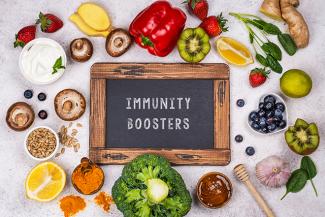
Rima Desai Rao, a registered dietitian, nutritionist and National Executive Member of the Indian Dietetic Association explains how your diet works to keep you healthy and help build immunity.
Keeping our immune system in prime condition is always of top priority in these challenging times. Any mention of boosting immunity, one starts thinking of superfoods and thinks it is a very quick job. Immuno boosters are not a magic potion that would provide immediate protection from disease. This is not how our complex immune system works. Your overall health and wellbeing affects your immunity.
What can you do to build immunity:
- Don't smoke
- Exercise regularly
- Eat right and drink water
- Get adequate sleep
- Follow safe hygiene protocols - washing hands, washng the food
- Minimise stress
- Maintain a healthy weight
- Get adequate sunlight
Diet and Immunity
As you can see diet does play an important role in building immunity by ensuring that you are meeting your nutritional needs. However, in order to build immunity one does not need any superfoods but a group of foods which are our everyday foods from our kitchen! These foods have various nutrients that play a vital role in protecting us against infections like :
Water
Vitamin A, B6, B12, C, D, E and Folate
Trace elements Zinc, Iron, Selenium, Magnesium & Copper
Omega 3 fatty acids - Eicosapentaenoic acid & Docosahexaenoic acids.
Soluble fiber
Proteins
A deficiency of any of the above nutrients can negatively impact the immune system. It is therefore important not just to ensure adequacy but also diversity in the everyday diet. Therefore, the focus on eating a balanced and wholesome diet is the only way to fulfill the varied requirements of our intricate immune system.
- Adequate hydration is the primary requirement for proper functioning of the body. Besides plain water, water infused with mint/ lemon/ tulsi/lemon grass/ ginger/cinnamon, soups, buttermilk, lemonade are different ways to ensure one does not fall short on this vital component.
- Include plenty of seasonal fruits and vegetables in different preparations (salads, cooked veggies, soups, chutneys, juices, mixed into cereals or dals) to ensure a supply of vitamins and minerals. Make sure you use a variety of different colored fruits and vegetables to get phytonutrients which have a protective function. Ensure that a minimum of 5 portions per day of this food group is consumed, increasing it to 7-8 portions is extremely beneficial.
- Include dals/ pulses in any its forms-whole, split, washed. In addition to dals, soy, beans, peas should also be included in the diet. Combining cereals with dals ( khichri/ idli/ missi roti/ sattu ) is a good way to enhance the quality of proteins in the diet. Also adding dairy increases the quantity and quality of proteins ( dahiwada, kheer )
- Dairy and its products including fermented preparations such yogurt, buttermilk are a source of proteins as well as that of beneficial micro organisms, which are known as probiotics.
- Inclusion of fermented foods which are known to strengthen the mucosal defense systems and the activity and movement of the immune cells should be part of our everyday menu. Fermentation not only increases the bioavailability of vitamins and minerals but also improves the diversity of gut bacteria. The diversity of gut bacteria is linked to better health and improved innate immunity.
- Nuts and seeds incorporated in various foods provides zinc, magnesium, and proteins, all essential for the working of the immune system.
- Using wholegrain cereals including millets ( instead of the refined versions like maida ) ensures adequate supply of fiber that is crucial for a properly functioning immune system.
- Spices, herbs and seasonings are not just a source of flavor but an important source of compounds that fight oxidation and inflammation. Dried roots, barks or seeds eg black cumin seeds, jeera, ajwain, methi seeds, cinnamon, turmeric are some examples. Amongst the herbs which are fresh leaves, stems, flowers it is tulsi, mint, lemongrass, bay leaf and cloves which need inclusion in the diet. The bulbous group of vegetables eg onion, garlic provide disease fighting compounds in ample doses.
- Including the omega 3 fats rich sources of fat (often lacking in diets) can help immunity functions. Sources of omega 3 fats are nuts, seeds, fatty fish, dals, green leafy vegetables. The oil of mustard, soy, rice bran, canola, also provide omega 3 fatty acids. Coconut oil which has established antiviral properties can be a part of the total recommended fat intake.
If there is a severe deficiency of any nutrient due to an unavoidable reason, supplements should be provided under the guidance of a doctor or a dietitian. Besides the balanced wholesome everyday diet, proper doses of sunshine, sleep and exercise is needed for a strong immune system.

Rima Desai Rao is a Registered Dietitian and Nutritionist and National Executive Member of the Indian Dietetic Association. She is an Associate Professor at Sadguru Homescience Rajkot in Foods and Nutrition since 25 years.





